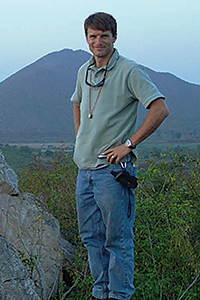Family feud
Is The Disthene Group settlement a cautionary tale for closely held companies?
Family feud
Is The Disthene Group settlement a cautionary tale for closely held companies?
At 34, Curtis Dixon Colgate is a multimillionaire. Yet his newfound riches came at a high personal cost. “It’s still bittersweet,” he says of a legal settlement that granted him $25 million. “It’s eight years that’s sundered my family.”
Colgate’s long battle against The Disthene Group Inc., a Dillwyn-based holding company that owns the largest kyanite mine in the world, came to an end in August when both sides signed off on a $77 million agreement.
The litigation pitted Colgate’s family members, who owned 42 percent of the company’s Class B, nonvoting shares, against their relatives: Gene Dixon Jr., Disthene’s president and chairman of the board (and Colgate’s uncle); and his son, Guy B. Dixon, president of the Kyanite Mining Corp. (Colgate’s cousin). The company’s top executives, they own all the Class A voting shares and, together with relatives and partnerships, more than 45 percent of the nonvoting shares.
 The high-stakes fight focused on the rights of minority shareholders. Lawyers from LeClairRyan, who represented Colgate’s family, hail the settlement as a “landmark” victory.
The high-stakes fight focused on the rights of minority shareholders. Lawyers from LeClairRyan, who represented Colgate’s family, hail the settlement as a “landmark” victory.
“The plight of the minority shareholders is that they’re basically captive investors,” says attorney John H. Craddock Jr. “There’s no market for their stock. They’ve got no way to get out of their investment. They have no vote in what’s going on. When you’re in a position like that, it’s very easy to take advantage of the shareholder, and that’s what they did.”
Yet some businesspeople say the outcome makes Virginia less friendly to companies. After all, a circuit judge recommended Disthene’s dissolution — the death penalty for any business.

The narrative behind the Disthene case sounds like something out of a legal thriller: There was a deathbed promise, accusations of greed and half-truths and the possibility of a court-ordered dissolution of a profitable, $200 million company owned by the family for four generations.
Besides the Kyanite Mining Corp., Disthene owned 28,000 acres of land and the historic Cavalier Hotel in Virginia Beach. As part of the settlement, the Cavalier was sold in July for $35.7 million. The proceeds helped Disthene buy out minority shareholders’ stock. The rest of the money, says Guy Dixon, came from internal savings, the liquidation of other company assets and loans against the mine and real estate holdings.
The largest payouts went to Curtis and his 49-year-old half-sister, Sharon Marie Newcomb, who also received $25 million. Curtis’ father, Marion J. “Boyd” Colgate Sr., held custodial shares and says he received a smaller amount, which he gave to his children. There were a few other shareholders who were paid a total of $7 million. The remainder of the settlement — nearly $20 million — went to LeClairRyan for legal fees.
The settlement allows the Dixons to keep their land and retain control over the lucrative Kyanite Mining Corp. Kyanite is a heat-resistant element used in everything from spark plugs to space shuttle tiles. The mine is Buckingham County’s largest private employer with about 130 workers.
Guy Dixon says the company and his family are “relieved” to have the suit behind them. “For while settling in this manner and under these terms is not the outcome we feel was justified, nor the path that we would have freely chosen, we do feel that it was in everybody’s best interests given the circuit court’s decision.”
Judge Roush’s opinion
Dixon was referring to a blistering, 41-page opinion by Fairfax Circuit Court Judge Jane Marum Roush, which preceded the settlement. Her ruling on Aug. 30, 2012, followed a trial in Buckingham on allegations in a lawsuit initially filed by Curtis, Sharon and Boyd in 2010. They said the Dixons engaged in a pattern of “oppressive and fraudulent conduct,” such as slashing the price of dividends, to retaliate against them for filing an earlier suit in 2005. That litigation, settled in 2007, alleged improprieties in Gene’s handling of a family trust that included shares of stock intended for Curtis and Sharon.
The Buckingham trial, which lasted 14 days, included more than 30 witnesses and 1,420 exhibits. After it was over, Roush ruled in favor of the plaintiffs’ request to dissolve Disthene. Although a drastic remedy, the judge said the move was merited because of “longstanding and ongoing oppression of minority shareholders as well as waste and misapplication of corporate assets.”
Roush concluded that Gene and Guy Dixon “were motivated not by the best interests of the corporation but by their personal best interests.” She ruled further that their actions were not protected by Virginia’s business judgment rule. While it shields directors from personal liability for decisions made on behalf of a corporation, the doctrine did not apply, she said, “because Disthene’s board of directors did not act as a board and make informed decisions. To the extent it had any involvement in the decisions, the board merely bent to Gene’s ironhanded will and rubberstamped his decisions.”
The judge cited several examples of evidence of misuse of corporate assets. There was cash compensation of $1.2 million for Gene and $560,800 for Guy in 2011, amounts not set by Disthene’s board, that she found “excessive” when compared with the compensation of other mining executives. Roush also noted the use of a corporate beach house owned by the Cavalier Hotel for no rent or a nominal fee, use of the company’s plane for personal trips, meals at the Cavalier for a fraction of their costs and the preparation of personal tax returns of Dixon family members by Disthene accountants — with those costs sometimes charged to the company.
The court also challenged the payment of $6.5 million by Disthene in premiums for life insurance policies owned by trusts established for the benefit of Gene’s children and grandchildren, calling the payments a “waste of corporate assets.”
Roush agreed with the plaintiffs that slashing dividends, without a vote by the company’s board, was retaliatory behavior. “The plaintiffs have not been treated fairly by Disthene and its management,” Roush wrote in her opinion. “They have instead been treated as irksome interlopers, problems to be dealt with, preferably by squeezing them out at a below-market price, or slashing their dividends in the hope of depriving them of the financial wherewithal to seek legal recourse.”
At trial, the Dixons denied that dividends were cut to hurt minority shareholders. Court filings showed that Disthene had paid more than $36 million in dividends since Gene Dixon, 70, became president in 1974, including more than $6 million paid to the plaintiffs since 1988. Since 2000, Disthene said it paid more than $8 million in dividends, or 70 percent of its profits.
“No one likes to see their business decisions retroactively twisted and contorted to prop up what can be described as a conspiracy theory,” says Guy Dixon. “And it was difficult for me to read the circuit court’s opinion, which did not address any of the facts showing that there was never any intent to oppress anybody. For example, there was no mention of the fact that our decision to temporarily reduce dividends in favor of increased capital investment led directly to the record-breaking profitability of the last few years.”
After the lower court’s ruling, the Disthene Group turned to the state Supreme Court, seeking a stay on the order to dissolve. In an appellant brief, the company’s legal team from Troutman Sanders argued, “the trial court abused its power and committed clear error in dissolving a corporation that has operated successfully for more than 70 years to the great benefit of its shareholders.”
The Virginia Supreme Court initially rejected the petition. In April of this year, it accepted the appeal after a request for a rehearing. After the two sides signed off on the settlement in August, however, the court dismissed the appeal and vacated the dissolution in conjunction with Disthene’s buyout of the minority shareholders.
Now that the legal dust has settled, observers are weighing in on the significance of the case. Michele K. Burke, a lead attorney who worked with the Colgate family on both lawsuits, says the decision represents one of the few clarifications of the business judgment rule. “It has national implications,” Burke said in a statement, “because the principles that minority shareholders have enforceable rights and that they must be treated fairly are generally applicable anywhere in the U.S.”
Burke told Virginia Business that minority shareholders rarely sue because of the financial burden. “They have to risk all their money. They had a huge disadvantage in both cases,” she says.
Boyd Colgate says the lawsuit cost the plaintiffs several million dollars before LeClairRyan agreed to continue the case on a contingency basis. “We heavily leveraged our homes and all our properties,” he says. Those costs were paid back, he adds, with the settlement money.
While Roush’s lower court ruling didn’t make any new law, the LeClairRyan team says the case sends a clear message. “This is a huge wake-up call to closely held businesses,” says Thomas M. Wolf, the attorney who managed the case for LeClairRyan. “Because there are so few reported cases of courts dissolving companies, there is the misperception that a controlling shareholder can run the company to benefit himself … This case should cause corporate officers, directors, controlling shareholders and legal advisers to look anew at the legal duties those roles carry — duties to the corporation and to its shareholders. The consequences for failing to do so can be severe.”

Tharpe’s company was one of 30 businesses that jointly hired an attorney and filed an amicus brief with the Virginia Supreme Court during the appeal process. His family-owned company has hauled Kyanite Mining Corp.’s sand to locations throughout Virginia, and he knows the Dixons. Even without that business relationship, he says, he would have supported the brief.
Walton Moseley, president of Cape School Inc. in Buckingham, which provides continuing education and licensing, also supported the brief. “That decision flipped Virginia from being a business-friendly state to a business less-friendly state,” he says. “It says that the decisions you’re making to run your business can be second-guessed, and you could end up in court defending those decisions. A lot of businesses like us don’t have the resources that Disthene has and having to go to court could financially cripple us.”
Roush’s opinion is a lower court decision, “and it’s not binding on anybody,” notes Everett W. Gee III. He’s the general counsel for S&M Brands in Lunenburg County and the lawyer who filed the amicus brief on behalf of the small businesses. “But if any plaintiff comes along, this will be the case they will be waving around.”
Litigation began in 2005
The first lawsuit filed against Disthene came two days before Christmas in December 2005. The seeds of the litigation, though, were planted long before that in the fourth-floor, Cape Henry Suite of the Cavalier Hotel on the Virginia Beach oceanfront.
That’s where Curtis’ mother, Jeanne Dixon Colgate, spent her last days before dying of breast cancer at age 47 in 1988.
In an interview with Virginia Business and in court testimony, Boyd Colgate said that, before his wife died, Jeanne told him that her younger brother, Gene, came to her room at The Cavalier and promised to protect the interests of her children: Sharon Newcomb, from her first marriage; and Curtis Colgate, her son with Boyd. Curtis was 9 at the time of her death, and Sharon was 24.
For years, Boyd says, Gene seemed to be honoring that pledge. Then in 2005, Boyd began to ask questions about his late wife’s estate to confirm the number of shares held by Curtis and Sharon. That’s when the businessman from Chase City says he learned that some 30,000 shares of Class B stock held in a family trust — created for Gene and Jeanne’s mother, Mallie, upon the death of their father and of which Gene was the trustee — had been shifted to Gene Dixon’s three children. Curtis and Sharon, who were contingent beneficiaries, filed suit, alleging manipulation of the trust.
The day before the suit was filed, Curtis called his cousin, Arch Dixon, another of Gene’s sons. Arch and his sister, Erica Dixon, were close to Curtis in age. He recalls that they used to spend summers together in Virginia Beach, playing hide and seek on the expansive lawn of The Cavalier.
“Arch, Erica and I were inseparable. We would play around all day long,” he recalls. “Arch and I, we stayed close through the years. I felt I owed it to him to give him a call. I said, ‘Sharon and I have had to sue your dad over the trust.’ That’s really about the last conversation I ever had with him.”
After a court hearing in 2007, the parties settled. About 11,600 shares were transferred from Gene’s side of the family to Sharon and Curtis, according to court documents. The next quarter after the suit was filed, Boyd says, Disthene’s dividend fell from what had consistently been about $4 to $6 a share to an all-time low of 85 cents. It stayed at that rate for 13 quarters, until 2010, “and that led to the second suit,” he says.

As it turns out, a group formed by Thompson — a local developer who built the Hilton Virginia Beach Oceanfront — bought the Cavalier. It plans a $200 million renovation of it and another former Disthene property on the oceanfront.
Looking back, Boyd had no idea the litigation would take so long. “It started out like an infant, and it just grew and grew.” He says he is comforted in knowing that the pledge to his late wife was made good. Plus, he hopes the case will be helpful to other minority shareholders.
Boyd doesn’t feel sorry for the Dixons. After the June 2012 trial, he says, they had a chance to resolve the case for less than $70 million through mediation and for a better price than the $1,928 per share they ended up paying — a figure nearly 10 times more than what the Dixons had offered to pay for minority shares in the past. At one point during mediation, Boyd recalls, Disthene’s offer was “zero.”
With the case behind him, Guy Dixon doesn’t expect “direct, long-lasting negative implications for our core business in terms of our sales, or our sales relations…”
The people in Buckingham know the company and its long history, he adds. “These people — the people that really matter — are not fools, and I don’t expect them to change their perception of what kind of people we are (and what kind of company we are) based on the false allegations and accusations that were made in a lawsuit that all along was meant to force a cash out of the minority shareholders on terms they dictated.”
Meanwhile, Curtis is trying to move on, too. He recently purchased a home in Virginia Beach with some of the settlement proceeds. At seven feet three inches, he stands out in a crowd. An avid fisherman, he is a member of Virginia’s Board of Game and Inland Fisheries where he recently was elected chairman.
That’s a new challenge he relishes. Plus, he wants to rebuild some of the family relationships strained by the litigation. “I’m still drinking it all in,” he says. “It definitely reset my whole life.”
s


















